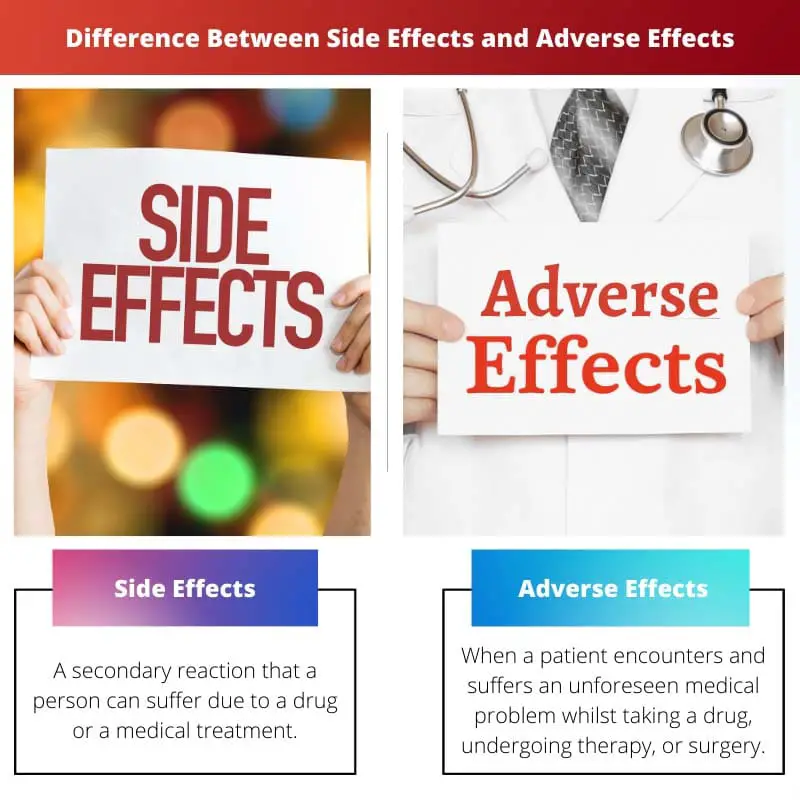The terms side effects and adverse effects are phrases that we have read often, and it is important to know the distinction between these two terms.
While the two may seem similar or interchangeable, several key distinctions exist, making the terms quite different from one another. These are medically used terms that help signify the cause and effect of a treatment faced by the patients.
Side effects and adverse effects help us better understand the condition of the individual in question and initiate the necessary actions to be taken.
Key Takeaways
- Side effects are predictable, unintended consequences of a drug experienced by patients in varying degrees.
- Adverse effects are unexpected, harmful reactions to a drug that may require medical intervention.
- Both side and adverse effects can occur in any individual, but the severity and occurrence depend on individual factors and drug interactions.
Side Effects vs Adverse Effects
Side effects are unintended and mild effects that may occur when a drug is taken. These effects are not serious and may or may not need dosage. Adverse effects are more severe and dangerous, resulting from a drug or medical intervention, and may vary from moderate to severe.

Side effects can be defined as a secondary reaction that a person can suffer due to a drug or a medical treatment. The term “side effects” is used in an unpleasant tone where the repercussions faced are not desirable.
Several drugs and treatments list down the side effects that the patients are prone to have suffered.
An adverse effect is a much more concentrated event where the patient encounters and suffers an unforeseen medical problem whilst taking a drug or undergoing therapy or surgery.
Adverse effects are problems that have a high degree of danger associated with their use. Due to their unexpected nature, adverse effects cannot always be called side effects.
Comparison Table
| Parameters of Comparison | Side Effects | Adverse Effects |
|---|---|---|
| Definition | A secondary reaction that a person can suffer due to a drug or a medical treatment. | When a patient encounters and suffers an unforeseen medical problem whilst taking a drug, undergoing therapy, or surgery. |
| Degree of danger | Since most side effects are cataloged during testing, it is relatively less dangerous. | Adverse effects can happen during surgeries, making them severely dangerous. |
| Forecast | Majority of the side effects are pre-listed. | Adverse effects are unexpected in nature. |
| Usage | Side effects are labeled in a drug, tablet, syrup, or medicine of any kind. | Adverse effects are used in relation to unexpected problems faced during therapy or surgery. |
| Consequences | Most side effects get resolved with time. | Adverse effects need quick intervention. |
What are Side Effects?
Side effects can be aptly described as a secondary reaction that a person can suffer due to a drug or a medical treatment.
Side effects are labelled on a drug, tablet, syrup, or medicine of any kind. Patients are advised to read and understand the side effects listed on a drug prior to its intake or usage.
Several drugs and treatments list down the side effects that the patients are prone to have suffered.
Side effects can be caused due to several reasons, such as incorrect dosage, the patient’s medical history and allergies, the immunity system, the expiry date, etc. Most side effects are mild and would get resolved with the passage of time.
Any reactions, influence, carryover, aftereffects, symptoms, aftermath, etc., of any kind in response to a drug, is known as a side effect.
Since all drugs have to undergo several kinds of research and clinical testing, most side effects are catalogued. The depth of the research depends on the severity, genuineness, and vastness of the research.
The term “side effects” is used in an unpleasant tone where the repercussions faced are not desirable. Therefore, it can be summarized that side effects are the aftermath of an unexpected and unpleasant reaction a person may have to face.

What are Adverse Effects?
An adverse effect refers to a concentrated event or situation where the patient encounters and suffers an unforeseen medical problem whilst taking a drug or undergoing therapy or surgery.
As the very name suggests, adverse effects have exponential consequences and repercussions that the patients face due to unforeseen problems caused.
Adverse effects are unexpected in nature and can happen during surgeries, making them severely dangerous. They cannot be resolved over time and need quick intervention.
Adverse effects can be classified into two types, namely Type A and Type B. Type A adverse effects refer to those consequences caused by the quantity of the medicine or dose administered to the patient.
It varies depending on this amount, causing mild, moderate, or severe repercussions. Type B adverse effects are much more dangerous due to their unpredictability.
These reactions have no connection to the doses triggered by the patient’s medical history, such as allergies, intolerance, and general immunity.
Adverse effects are problems that have a high degree of danger associated with their use. Due to their unexpected nature, adverse effects cannot always be called side effects.
It is important to react quickly and cautiously in such situations and try to prevent them from happening.
Main Differences Between Side Effects and Adverse Effects
- A side effect is a secondary reaction that a person can suffer due to a drug or medical treatment. An adverse effect is when a patient encounters and suffers an unforeseen medical problem while taking a drug, undergoing therapy, or surgery.
- Most side effects are pre-catalogued, making them less dangerous. Adverse effects occur during surgeries, making them severely dangerous.
- Since side effects are determined after extensive testing, they can be foretold or cautioned against. Adverse effects are mostly unexpected in nature, making them difficult to predict.
- Side effects can get resolved spontaneously with time, whereas adverse effects need quick and cautious intervention.
- Side effects are labelled in a drug, tablet, syrup, or medicine of any kind, making them foreseeable. Adverse effects, on the other hand, are used in relation to unexpected problems faced during therapy or surgery.

- https://www.ingentaconnect.com/content/ben/cds/2011/00000006/00000001/art00001
- https://www.pharmacytimes.com/view/adverse-event-not-the-same-as-side-effect

The definition of side effects and adverse effects is clear and the comparison provided is highly educational. A well-written and compelling article overall.
This article seems to be more focused on a medical audience as it goes into depth about these terms. Although it was informative, it is not very suitable for those without a medical background.
The author does a fine job of explaining the differences between these two terms through a clear comparison. I truly appreciate how the article is structured and how it highlights the importance of swift intervention in cases of adverse effects.
I definitely found the information worthwhile. I’d also like to point out that the references cited in the article lend credibility to the content.
The article gives a detailed and comprehensive description of the differences between side effects and adverse effects. A very useful and informative article.
I completely agree with you, Morgan. The author elegantly provided the necessary information on both terms. I find it particularly interesting how these terms are used in a medical context.
I was already aware of the differences but the article did a good job of providing a comprehensive overview. The Comparison Table was particularly helpful.
The article could have benefitted from more practical examples to illustrate the concepts of side effects and adverse effects. I feel that the article was too theoretical.